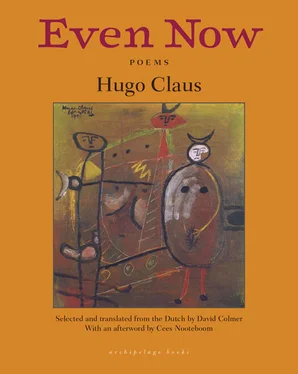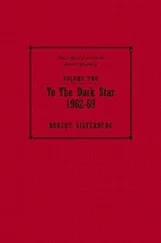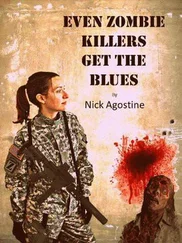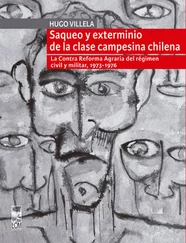As always, the bandy-legged farmers came
to stare at the rain-bringing train,
bowing chastened to the ground.
No more than a legend, they dig the earth
like harnessed ploughshares. And vote compliantly.
Cherishing their farms and children Senator and priest
so sacred groaning wins over legislators
and no-one ever hits his neighbour, in astonishment
and fury at the sameness of things.
No-one vomits, skin rules and smothers the broad suspicions.
I don’t want to go on, they are contagious, I want
to go back to being wrapped in the jabbering that dims as
Death defeats me.
Come here. Now? Come on. “Look into my eyes.”
Bruges. My mother holds her babe — her prey — tight.
They have to search inside her.
The doctors at her bed compare makes of cars
and my father beeps at the gate.
Boneblack and dead I am born between
the hospital Memlincs,
Ursula among the angels wrapped in membranes.
No vine leaves or deerskin,
but metal organ pipes.
The seraphic canon: my first breastplate.
Again the year takes off its coat
in the city of lacework, obsequies and star-shaped vaults.
Oh, the old-style zinc smirks
of paladins, prelates and pimps
crammed onto panels!
On brick walls: the Annunciation.
Naked with a dagger and a feather hat: Lucrezia.
How elegantly mocking
is the past.
The fools of Bruges stand at the back
of the preaching hurtful mob.
Like the moth-
eaten myth.
[…]
from Lord Wildboar [1970]
THE DEATH OF HIS FOREFATHER
He left us well before he died,
six months before, dull, broke, reeking, wrecked,
for all he walked intact from room to room.
“I haven’t known a moment’s joy,”
he said and tried to breathe,
audibly in the cooking smells.
He then turned blue. Like a plum.
He loved his plums. And cherries too,
the younger the better. Mother sat alone.
Not that he was dead just yet. No,
he held onto the chairs, seasick.
It was his heart that wouldn’t die,
the engine. The chassis, the bodywork
were shot but the engine was still good.
He took to bed and sometimes he was dead.
The nuns hissed, “Yes, his time has come.”
But with a gasp and a hiccup,
he started up again; just bluer.
They took him to the room
reserved for dying—
where the soul escapes decay.
His head was clearly shrinking,
the size now of a woman’s fist.
With staring eyes. But could they see?
Nature takes its course. They stopped
his food and drink, but still he wanted it;
he chewed. The nuns sang the Angelus .
When they dabbed his lips with a sponge,
he bit into it and wouldn’t let go.
They pinched his nose and he let go.
No rattle. A gasp and hiccup now and then.
Yes, his time had come. Freezing cold below the knees
and sweating up above. But the engine didn’t stop.
They gave up bed baths. Turning him
might jolt his heart and make it stop.
Eau de Cologne, not too strong, on his temples.
Don’t talk too loud. Don’t mention debt.
Or signatures. Could you please leave now, sir.
Son or not, please leave. He hears it all, every word.
The inside of his mouth turned black. His skin—
the less said the better. They wiped away the black
that crept into the edges of the sores, so fast.
Fist-sized craters in the cheeks of his arse,
with black mouldy edges. Declutch, a shock, he over-
strained the engine. Which stopped, thank God.
And suddenly collapsed in on itself.
They filled the man-sized hole inside
with cardboard and cotton wool.
And wrenched him straight, before he stiffened,
or else they’d have to break the bones
to make him look good in the coffin.
No washing even now. Each touch disturbs
the flesh, as light as pollen in spring,
bone dust in the wounds.
Difficult sorrow came for Sir Wildboar,
beset by attorneys and family meetings
and the days of the cart and the funeral.
I was the nail in his coffin, he often said.
Even now, a fingernail, as a final gesture,
scratching the walnut of his head.
Lord, take your son into your arms.
The women went left (all lovers).
The men went right (all sons).
The time of the earth fermenting inside him now.
The time of the seasons. Quick give me a beer.
Forefathers galore — and all cut off.
1
The slow cattle of my days
and all those years of rancour,
bad-tempered romps in the garden next door.
I dreamt I unzipped my lashes
and gave them to you, merciful one,
and you blew them like a dandelion,
oh, restrain your punishing hand!
In my subterranean warehouse of words
the iron jams, the plum bursts open,
teeth chip and splinter.
Your holy bread won’t heal me.
Nails, thorns and Veronica’s veil.
And how the guts of the three murderers
on Golgotha dried out, the third one’s too!
Your will be done!
The temple curtain works itself loose,
falling over my eyes, my lips, my crotch
through the intercession of all your mutilated children.
2
It’s later than anyone imagines.
What’s growing in our core?
What’s gnawing on our backbone?
We carry our skin.
—Benevolent one.
And we are not scorched
though darkness falls
in the stairwell of thought
and night splits the tips of our fingers.
—Look down in mercy.
Warts from earlier crimes
are planted in the child
in its mother’s womb.
Quick. Slide Father under the bed,
put on a crash helmet.
—I place myself
at your disposal.
3
The house rustles, a board snaps loose like a shot.
Then someone says my name,
nearby, more clearly than my mother used to call
in the darkening street.
Clattering leaves,
animals lapping water,
and my name again,
like the bark of a birch bursting open.
Listening to the muffled tick
accelerating in my wrist
I wait for the order that will now
descend from a hellish flock of crows.
Demolish the house, brick by brick?
Quell the embryo inside of her?
What must I incinerate?
How to smother forever the prayer
rattling around my bed?
This nation that supposedly
moves between two poles,
excess and godliness,
believes less in the hereafter
than in its daily groats.
This nation will give alms on Sunday
for the pope or Africa,
or burn incense to venerate the statue
of the Curé d’Ars who stank of the poor,
but generally pays and prays to calm
its fear of leaner years and butter up
its docile rulers, the realtors.
The soil here’s the richest.
Even after all these years without manure
you could grow a dead-man’s leek
to beat the best.
The British veterans grow scarce.
Each year they point out to their scarcer friends:
Hill Sixty, Hill Sixty-One, Poelcapelle.
In Flanders Fields the threshers drive
in ever tighter rings around the winding lines
of hardened sandbags, the bowels of death.
Читать дальше












